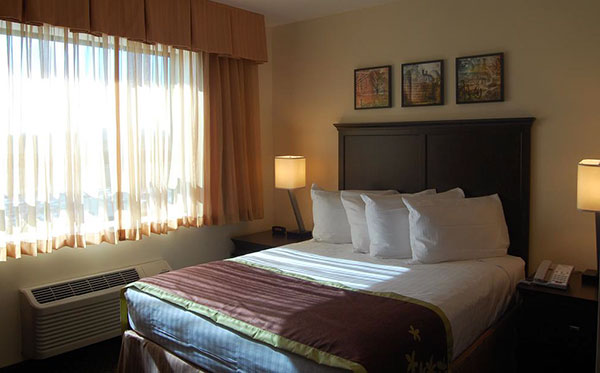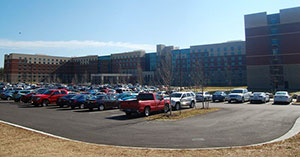A gargantuan on-base, government-owned hotel at Fort Lee in Petersburg is open for business.
The 504,000-square-foot, 1,000-room Fort Lee Lodge, built to house soldiers training at Fort Lee’s Army Logistics University, began serving troops in late December after being under construction for two years. It is the largest such lodging facility in the U.S. Army.
The $86.3 million property has more than two miles of hallways running through seven stories on 27.5 acres, said Marc Jannsen, the hotel’s manager, during a tour of the facility Tuesday.
“Each room has a 32-inch, high-definition flat screen with Blu-ray,” he said, “which is standard throughout the Army.”Each room also has a kitchenette, Wi-Fi, an ironing board and a hair dryer, just like you would find in most private-sector hotels.
St. Louis-based Korte was the contractor on the project.
Jannsen said that the hotel is operating at about 68 percent occupancy but that that rate would swell closer to the summer. The average stay is about nine days, with the longest stay being about three months, he said.
The facility is operated by the Army, but Fort Lee garrison commander Col. Rodney Edge said that could change.
“It hasn’t been decided yet whether the management would be contracted out,” Edge said. “If you look around the Army, there are quite a few that are run that way.”
The hotel has been a source of concern to the Petersburg area hospitality industry, which for years has contracted with the Army to house overflow soldiers from Fort Lee.
Hotel owner Nick Patel of Kalyan Hospitality said he isn’t sure what effect the on-base hotel would have on his business.
“It’s really too early to tell,” Patel said. “It’s January, so typically all our hotels in the Tri-Cities area are slow this time of year. Once March/April rolls around, and all the soldiers are in town, then we’ll know what impact it’s having.”
Kalyan operates a Hampton Inn, a Comfort Inn and a Holiday Inn Express in the Fort Lee area and a Comfort Suites and Candlewood Suites in nearby Colonial Heights, all of which are still contracted with the Army for boarding Fort Lee soldiers.
Temporary lodging for soldiers at Fort Lee is big business in Petersburg. Last year, the Army disallowed the practice of soldiers staying at local apartment buildings on short-term leases, requiring them to stay at government-approved hotels.
The Lodging Success Program, which is now the Army’s standard rental policy, requires soldiers who could not be housed on-base to stay in properties featuring, among other things, video surveillance at all entrances and exits, daily housekeeping, free Internet and cable and — high up in the requirements — interior corridors for security purposes.
That program ruled out virtually every apartment complex in the region, because almost all of them have exterior corridors.
Apartment owners howled in opposition and hired a lobbyist to get the Army to review its policies. In July, the Army changed its policies to allow apartments that could meet the revised standards to apply to house its soldiers.
Going forward, any hotel or apartment complex that wants to compete with the Army-owned Fort Lee Lodge must go through the contract bidding process.
A gargantuan on-base, government-owned hotel at Fort Lee in Petersburg is open for business.
The 504,000-square-foot, 1,000-room Fort Lee Lodge, built to house soldiers training at Fort Lee’s Army Logistics University, began serving troops in late December after being under construction for two years. It is the largest such lodging facility in the U.S. Army.
The $86.3 million property has more than two miles of hallways running through seven stories on 27.5 acres, said Marc Jannsen, the hotel’s manager, during a tour of the facility Tuesday.
“Each room has a 32-inch, high-definition flat screen with Blu-ray,” he said, “which is standard throughout the Army.”Each room also has a kitchenette, Wi-Fi, an ironing board and a hair dryer, just like you would find in most private-sector hotels.
St. Louis-based Korte was the contractor on the project.
Jannsen said that the hotel is operating at about 68 percent occupancy but that that rate would swell closer to the summer. The average stay is about nine days, with the longest stay being about three months, he said.
The facility is operated by the Army, but Fort Lee garrison commander Col. Rodney Edge said that could change.
“It hasn’t been decided yet whether the management would be contracted out,” Edge said. “If you look around the Army, there are quite a few that are run that way.”
The hotel has been a source of concern to the Petersburg area hospitality industry, which for years has contracted with the Army to house overflow soldiers from Fort Lee.
Hotel owner Nick Patel of Kalyan Hospitality said he isn’t sure what effect the on-base hotel would have on his business.
“It’s really too early to tell,” Patel said. “It’s January, so typically all our hotels in the Tri-Cities area are slow this time of year. Once March/April rolls around, and all the soldiers are in town, then we’ll know what impact it’s having.”
Kalyan operates a Hampton Inn, a Comfort Inn and a Holiday Inn Express in the Fort Lee area and a Comfort Suites and Candlewood Suites in nearby Colonial Heights, all of which are still contracted with the Army for boarding Fort Lee soldiers.
Temporary lodging for soldiers at Fort Lee is big business in Petersburg. Last year, the Army disallowed the practice of soldiers staying at local apartment buildings on short-term leases, requiring them to stay at government-approved hotels.
The Lodging Success Program, which is now the Army’s standard rental policy, requires soldiers who could not be housed on-base to stay in properties featuring, among other things, video surveillance at all entrances and exits, daily housekeeping, free Internet and cable and — high up in the requirements — interior corridors for security purposes.
That program ruled out virtually every apartment complex in the region, because almost all of them have exterior corridors.
Apartment owners howled in opposition and hired a lobbyist to get the Army to review its policies. In July, the Army changed its policies to allow apartments that could meet the revised standards to apply to house its soldiers.
Going forward, any hotel or apartment complex that wants to compete with the Army-owned Fort Lee Lodge must go through the contract bidding process.





That thing is massive.
The should have split it in two and stacked one half on top of the other and put the 14 story building in downtown Petersburg. (Or better yet, built a 28 story building).
Would have done wonders for that area.
Obviously there are some pretty good reasons why they didn’t go with that scheme…
First, this isn’t a commercial hotel. It was built with Pentagon funds, so they couldn’t have built it downtown. Second, the reason they built so many rooms in one location is that it is on the campus of the logistics university. Locating the students here means that they won’t need transportation to and from classes. They can walk across the street to class. When a soldier or civilian goes to training, the government has to pay their transportation costs to and from the school. Plus, having soldiers on post gives better oversight for their safety. Anything built downtown will have… Read more »
Why would the Army want to put Petersburg’s interests before its own? A 1,000 room hotel that is guaranteed to be mostly full would help any locality – that’s easy to understand. I feel the new hotel on base is much better for soldiers. That should be the primary concern, not giving Petersburg a handout. Petersburg is on 95, so if the hotels are well run they can get business. The area should be more than thankful that Fort Lee doubled in size.
I agree. The Army used to use the hotels off 95 at Petersburg. I was in class with a couple of people who were staying in one. They were not thrilled with their accomodations. Anyone who has driven through that area at night would know why. Besides, there is a huge abandoned hotel on the exit right now. If there were a profit to be had, somone would have bought it and renovated by now.